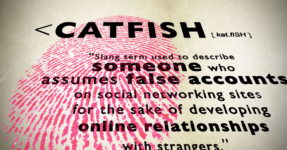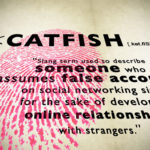Home and Away Catfisher’s Sentence Increased on Appeal

A Victorian woman who posed as various celebrities, including Home and Away star Lincoln Lewis, to obtain intimate images she then used to stalk and harass her victims has had her prison term increased after appealing on grounds that her original sentence was too severe.
Years of psychological abuse
32-year old Lydia Abdelmalek’s campaign of abuse commenced more than a decade ago, when she took on the personas of multiple celebrities in a concerted effort to exert psychological cruelty on the women she targeted.
After capitalising on their vulnerabilities and desire for an ongoing relationship, as well as gaining control by obtaining naked images of the women, Ms Abdelmalek then proceeded to make various threats including that she would publish the images if they did not comply with her demands.
She contacted a number of the women dozens of times a day, using her position of power to ensure they complied with what she asked of them.
Several of her victims, fearful of the consequences of not heeding her demands, maintained contact despite not wanting to be associated with the person they believed was a celebrity gone mad.
Ms Abdelmalek’s scheme could have unraveled in 2011, when one of her victims happened to be close to a mutual friend of Lincoln Lewis, one of the actors whose persona Abdelmalek exploited.
The woman became suspicious after receiving a string of bizarre and concerning messages which purported to be from the act, before contacting the mutual friend who then informed the actor who, of course, confirmed he was not responsible for the communications.
Mr Lewis posted on his social media pages that someone was impersonating him to lure victims and warned his followers and the public to beware of such conduct.
Sadly, the ‘close call’ did not deter Ms Abdelmalek’s from continuing her course of conduct.
Cruelty leads to tragedy
To the contrary, Ms Abdelmalek developed an elaborate web of lies and full cast of personas over the years, supported by mountains of material such as photoshopped images and stolen voicemail messages – all used to lure her female victims and exert coercive control over them.
One of those victims, known only by the pseudonym Emma, struggled with post-traumatic stress, depression and anxiety years of abusive and harassment, taking her own life in 2018.
Ms Abdelmalek had been sending Emma up to 60 messages a day, including while she was working as an international flight attendant.
Initial hearing and sentence
Ms Abdelmalek was eventually charged with multiple counts of stalking.
She pleaded not guilty, which meant her victims had to appear before the court to testify and face cross-examination; thereby reliving their trauma.
She was ultimately found guilty of six counts of stalking and, in 2019, sentenced to two years and eight months in prison.
Appeal to County Court
Her criminal defence lawyers immediately filed an appeal on her behalf to the Victorian County Court against both their client’s convictions and the severity of the sentence.
In May of this year, the appeal against conviction was dismissed and the matter was adjourned for hearing of the severity appeal.
She was remanded in custody pending the outcome of that appeal.
Sentence increased
Rather than decreasing the original sentence, County Court Judge Claire Quin did the opposite – extending Ms Abdelmalek’s prison term by a year in four months, bringing it to a total of four years.
During the sentencing proceedings, the court heard that Ms Abdelmalek reveled in stakling harassing and hurting her victims; conduct which gave her a sense of power, dominance and importance.
Her honour remarked of the “cruel” and “brutal” nature of the crimes, calling her actions “persistent and malicious.”
“Despite the content of some of the material being reflective of a fictional soap opera, it was not fantasy. It was real and impacted real people”, she stated.
“It’s all too easy and seemingly without consequence for offenders to anonymously torment and deceive those that they encounter in the electronic world”.
Ms Abdelmalek’s lawyer did not provide a reason for the commission of the crimes.
Devastating impact on victims
It is difficult to understand why these people, known as ‘catfishers’, would engage in such conduct.
Some believe it’s a form of addiction. Others feel that people who suffer from low self-esteem issues choose to adopt fake personas to feel better about themselves.
Motivation can also become apparent from the nature of the conduct itself. So, for example, greed is a primary motivation for those who systematically seek to extract money through blackmail, also known as extortion. While others who seek to obtain intimate images may have sexual gratification as motivation for their offences.
But irrespective of the reasons or the motive, the impact on victims is traumatic and devastating – finding out that you have trusted and believed in something that is nothing more than an elaborate, persistent lie can lead to a range of emotional responses, some of which are difficult to recover from.
Calls to make catfishing a crime
In New South Wales, as in most states in Australia, catfishing is not a crime in and of itself, although the actions of catfishers can often amount to a criminal offence, such as stalking and intimidation, which are contained in section 13 of the Crimes Personal and Domestic Violence Act 2007, which carries a maximum penalty of 5 years in prison.
In addition, section 192E of the Crimes Act can cover catfishing situations where the catfish takes advantage of the victim for money or property, can amount to fraud.
There are also laws within the Crimes Act to laws which protect children from online predators who try to exploit them for sexual acts, and laws which make it easier to prosecute those suspected of planning to prey on children, such as Carly’s Law.
But in the wake of the disappearance of NSW woman Renae Marsden in 2013, there have been calls for the Government to introduce specific catfishing laws.
The case of Renae Marsdon
Renae was last seen by her parents when she told them she was headed out to dinner with friends, but police believe that she drove to The Gap in the eastern suburbs, before throwing her phone into the ocean and then taking her own life. Her body has never been found.
Renae’s parents believe that, earlier in the day, she had found out that the man, ‘Brayden’ she had thought she was in a relationship with for the previous 18 months was fictional — made up by a friend. Brayden was the last person Renae texted before she disappeared. The contents of the text message have not been made public.
Brayden’s backstory included details that he was in prison, but that his parents had been able to pay off prison staff in order for him to have a phone. Even today, Renae’s parents don’t know if ‘Brayden’ exists. They suspect he was made up by one of Renae’s friends who they say was obsessed with her.
Time to change the law?
While Catfishers may create multiple different personalities to seek fake relationships online, some are actually real people who, alternatively, lie about their own personal circumstances – they don’t divulge they are married or in a relationship, or they may pretend to be wealthy.
Many people believe that the threat of being catfished is simply a risk you take when you meet people online and there’s plenty advice about how to spot the ‘red flags’
But even so it is a particularly predatory and malicious form of manipulation, and with more people than ever before meeting and socialising online, perhaps it is time to change the law.
Certainly, the sentencing of Ms Abdelmalek shows that courts take catfishing very seriously, particularly when the actions of the perpetrator have severely impacted victims enough to take their own lives.
Receive all of our articles weekly
Related Articles
RELATED LEGISLATION
- Section 91Q Crimes Act 1900 | Distribute intimate image without consent
- Section 249K Crimes Act 1900 | Blackmail
- Section 13 Crimes (Domestic and Personal Violence) Act 2007 | The Offence of Stalking or Intimidation
- Section 91P Crimes Act 1900 | Record intimate image without consent
- Section 91R Crimes Act 1900 | Threaten to record or distribute intimate image







